构词法
- 格式:doc
- 大小:76.00 KB
- 文档页数:8

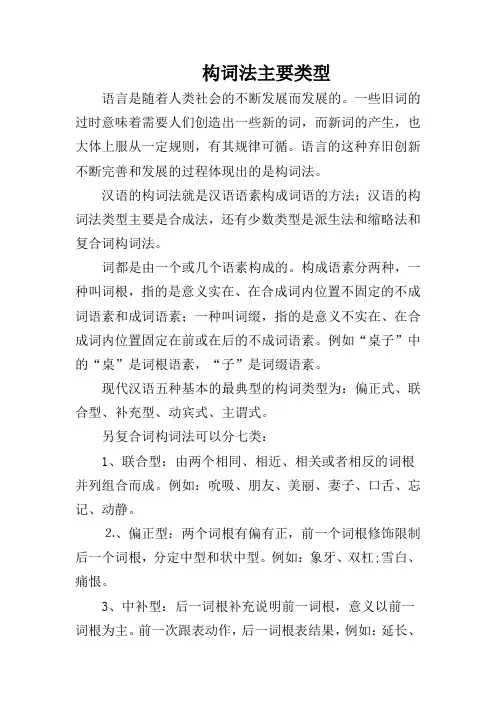
构词法主要类型语言是随着人类社会的不断发展而发展的。
一些旧词的过时意味着需要人们创造出一些新的词,而新词的产生,也大体上服从一定规则,有其规律可循。
语言的这种弃旧创新不断完善和发展的过程体现出的是构词法。
汉语的构词法就是汉语语素构成词语的方法;汉语的构词法类型主要是合成法,还有少数类型是派生法和缩略法和复合词构词法。
词都是由一个或几个语素构成的。
构成语素分两种,一种叫词根,指的是意义实在、在合成词内位置不固定的不成词语素和成词语素;一种叫词缀,指的是意义不实在、在合成词内位置固定在前或在后的不成词语素。
例如“桌子”中的“桌”是词根语素,“子”是词缀语素。
现代汉语五种基本的最典型的构词类型为:偏正式、联合型、补充型、动宾式、主谓式。
另复合词构词法可以分七类:1、联合型:由两个相同、相近、相关或者相反的词根并列组合而成。
例如:吮吸、朋友、美丽、妻子、口舌、忘记、动静。
⒉、偏正型:两个词根有偏有正,前一个词根修饰限制后一个词根,分定中型和状中型。
例如:象牙、双杠;雪白、痛恨。
3、中补型:后一词根补充说明前一词根,意义以前一词根为主。
前一次跟表动作,后一词根表结果,例如:延长、放大。
前一词根表事物,后一词根表单位,例如:书本、诗篇。
4、动宾型:前一词根表示动作行为,后一词根表示动作所支配、关涉对象。
例如:举重、动员、承包。
5、主谓型:前一词根表示被陈述的事物,后一词根是陈述前一词根。
例如:地震、心疼、国营、月亮。
6、连动性:由两个表示先后动作的词根构成。
例如:来访、查办。
7、重叠型:由两个相同的词根相叠而成。
例如:哥哥、刚刚、常常、大大。
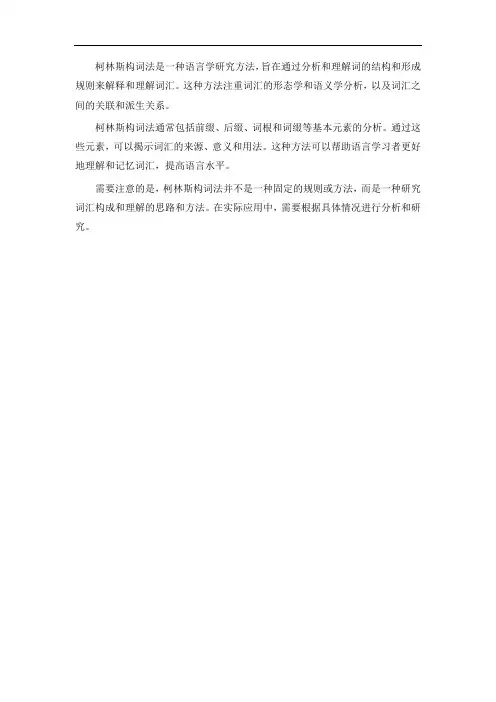
柯林斯构词法是一种语言学研究方法,旨在通过分析和理解词的结构和形成规则来解释和理解词汇。
这种方法注重词汇的形态学和语义学分析,以及词汇之间的关联和派生关系。
柯林斯构词法通常包括前缀、后缀、词根和词缀等基本元素的分析。
通过这些元素,可以揭示词汇的来源、意义和用法。
这种方法可以帮助语言学习者更好地理解和记忆词汇,提高语言水平。
需要注意的是,柯林斯构词法并不是一种固定的规则或方法,而是一种研究词汇构成和理解的思路和方法。
在实际应用中,需要根据具体情况进行分析和研究。
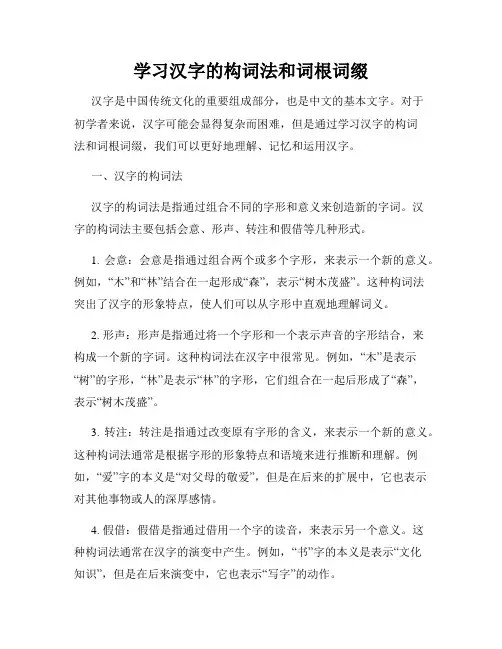
学习汉字的构词法和词根词缀汉字是中国传统文化的重要组成部分,也是中文的基本文字。
对于初学者来说,汉字可能会显得复杂而困难,但是通过学习汉字的构词法和词根词缀,我们可以更好地理解、记忆和运用汉字。
一、汉字的构词法汉字的构词法是指通过组合不同的字形和意义来创造新的字词。
汉字的构词法主要包括会意、形声、转注和假借等几种形式。
1. 会意:会意是指通过组合两个或多个字形,来表示一个新的意义。
例如,“木”和“林”结合在一起形成“森”,表示“树木茂盛”。
这种构词法突出了汉字的形象特点,使人们可以从字形中直观地理解词义。
2. 形声:形声是指通过将一个字形和一个表示声音的字形结合,来构成一个新的字词。
这种构词法在汉字中很常见。
例如,“木”是表示“树”的字形,“林”是表示“林”的字形,它们组合在一起后形成了“森”,表示“树木茂盛”。
3. 转注:转注是指通过改变原有字形的含义,来表示一个新的意义。
这种构词法通常是根据字形的形象特点和语境来进行推断和理解。
例如,“爱”字的本义是“对父母的敬爱”,但是在后来的扩展中,它也表示对其他事物或人的深厚感情。
4. 假借:假借是指通过借用一个字的读音,来表示另一个意义。
这种构词法通常在汉字的演变中产生。
例如,“书”字的本义是表示“文化知识”,但是在后来演变中,它也表示“写字”的动作。
二、词根词缀的运用除了构词法,词根词缀也是学习汉字的重要部分。
词根词缀是指汉字中具有一定意义的字形,可以通过添加前缀或后缀的方式,构成新的字词。
1. 词根:词根是指具有一定意义的字形,它可以作为一个单词的基础部分。
例如,“人”是表示“人类”的词根,“人民”可以由“人”和“民”的词根组合而成。
2. 前缀:前缀是指添加在词根前面的字形,用来修饰或改变词义。
例如,“美”是表示“美丽”的前缀,“美食”可以由“美”和“食”的词根组合而成。
3. 后缀:后缀是指添加在词根后面的字形,用来修饰或改变词义。
例如,“性”是表示“性质”的后缀,“善良”可以由“善”和“良”的词根组合而成。
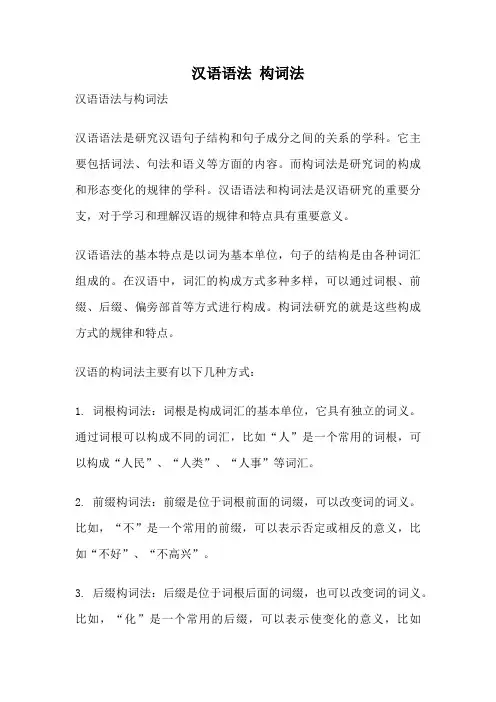
汉语语法构词法汉语语法与构词法汉语语法是研究汉语句子结构和句子成分之间的关系的学科。
它主要包括词法、句法和语义等方面的内容。
而构词法是研究词的构成和形态变化的规律的学科。
汉语语法和构词法是汉语研究的重要分支,对于学习和理解汉语的规律和特点具有重要意义。
汉语语法的基本特点是以词为基本单位,句子的结构是由各种词汇组成的。
在汉语中,词汇的构成方式多种多样,可以通过词根、前缀、后缀、偏旁部首等方式进行构成。
构词法研究的就是这些构成方式的规律和特点。
汉语的构词法主要有以下几种方式:1. 词根构词法:词根是构成词汇的基本单位,它具有独立的词义。
通过词根可以构成不同的词汇,比如“人”是一个常用的词根,可以构成“人民”、“人类”、“人事”等词汇。
2. 前缀构词法:前缀是位于词根前面的词缀,可以改变词的词义。
比如,“不”是一个常用的前缀,可以表示否定或相反的意义,比如“不好”、“不高兴”。
3. 后缀构词法:后缀是位于词根后面的词缀,也可以改变词的词义。
比如,“化”是一个常用的后缀,可以表示使变化的意义,比如“变化”、“化学”。
4. 偏旁部首构词法:偏旁部首是汉字中具有一定意义的部分,通过组合不同的偏旁部首可以构成不同的词汇。
比如,“木”是一个常用的偏旁部首,可以构成“林”、“森”等词汇。
汉语语法和构词法的研究对于汉语的学习和理解具有重要意义。
通过学习汉语的语法和构词法,可以更好地掌握汉语的表达方式,提高汉语的运用能力。
同时,了解汉语的语法和构词法规律,也可以帮助我们正确理解和解读汉语文本,避免歧义或错误信息的产生。
汉语语法和构词法是汉语研究中的重要内容,它们相互关联,相互影响,共同构成了汉语的基本规律和特点。
通过学习和掌握汉语的语法和构词法,我们可以更好地理解和运用汉语,提高汉语的表达能力和交流能力。
希望大家能够重视汉语语法和构词法的学习,不断提升自己的汉语水平。
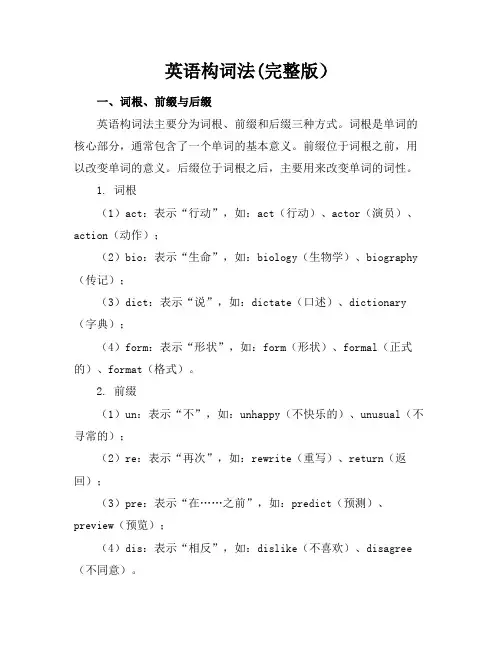
英语构词法(完整版)一、词根、前缀与后缀英语构词法主要分为词根、前缀和后缀三种方式。
词根是单词的核心部分,通常包含了一个单词的基本意义。
前缀位于词根之前,用以改变单词的意义。
后缀位于词根之后,主要用来改变单词的词性。
1. 词根(1)act:表示“行动”,如:act(行动)、actor(演员)、action(动作);(2)bio:表示“生命”,如:biology(生物学)、biography (传记);(3)dict:表示“说”,如:dictate(口述)、dictionary (字典);(4)form:表示“形状”,如:form(形状)、formal(正式的)、format(格式)。
2. 前缀(1)un:表示“不”,如:unhappy(不快乐的)、unusual(不寻常的);(2)re:表示“再次”,如:rewrite(重写)、return(返回);(3)pre:表示“在……之前”,如:predict(预测)、preview(预览);(4)dis:表示“相反”,如:dislike(不喜欢)、disagree (不同意)。
3. 后缀(1)ness:表示“状态”,如:happiness(幸福)、sadness (悲伤);(2)ful:表示“充满”,如:hopeful(充满希望的)、careful(小心翼翼的);(3)ly:表示“副词”,如:quickly(迅速地)、slowly(慢慢地);(4)tion:表示“动作、状态”,如:action(动作)、invention(发明)。
二、合成法与派生法在英语构词法中,除了词根、前缀和后缀,还有合成法和派生法两种重要的构词方式。
这些方法丰富了英语词汇,使得表达更加精确和多样。
1. 合成法(1)名词+名词:如:snowfall(降雪)、bookstore(书店);(2)名词+形容词:如:worldwide(全世界的)、citywide(全市的);(3)形容词+形容词:如:darkblue(深蓝色的)、lightgreen (浅绿色的);(4)动词+副词:如:lookup(查阅)、takeover(接管)。
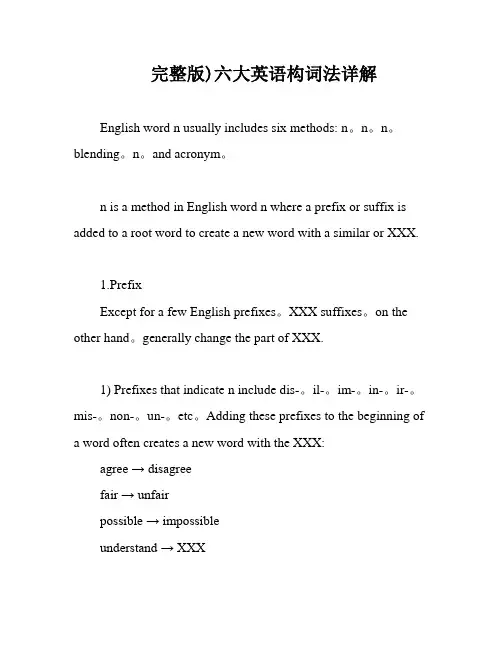
完整版)六大英语构词法详解English word n usually includes six methods: n。
n。
n。
blending。
n。
and acronym。
n is a method in English word n where a prefix or suffix is added to a root word to create a new word with a similar or XXX.1.PrefixExcept for a few English prefixes。
XXX suffixes。
on the other hand。
generally change the part of XXX.1) Prefixes that indicate n include dis-。
il-。
im-。
in-。
ir-。
mis-。
non-。
un-。
etc。
Adding these prefixes to the beginning of a word often creates a new word with the XXX:agree → disagreef air → unfairpossible → impossibleunderstand → XXX2) Other common prefixes include a- (often used to form predicate adjectives)。
anti- (against。
resistant)。
auto- (self)。
co- (together)。
en- (to cause to be)。
inter- (mutual)。
re- (again)。
sub- (under。
lesser)。
tele- (emphasizing distance)。
etc。
For example:co-workerXXXcooperaterewriteXXX2.SuffixAdding a suffix to a word is also an important method of English word XXX often change the part of speech of a word。
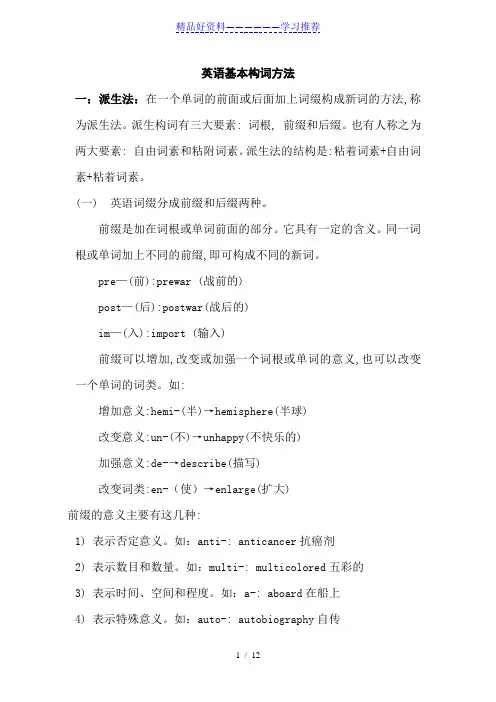
英语基本构词方法一:派生法:在一个单词的前面或后面加上词缀构成新词的方法,称为派生法。
派生构词有三大要素: 词根, 前缀和后缀。
也有人称之为两大要素: 自由词素和粘附词素。
派生法的结构是:粘着词素+自由词素+粘着词素。
(一)英语词缀分成前缀和后缀两种。
前缀是加在词根或单词前面的部分。
它具有一定的含义。
同一词根或单词加上不同的前缀,即可构成不同的新词。
pre—(前):prewar (战前的)post—(后):postwar(战后的)im—(入):import (输入)前缀可以增加,改变或加强一个词根或单词的意义,也可以改变一个单词的词类。
如:增加意义:hemi-(半)→hemisphere(半球)改变意义:un-(不)→unhappy(不快乐的)加强意义:de-→describe(描写)改变词类:en-(使)→enlarge(扩大)前缀的意义主要有这几种:1)表示否定意义。
如:anti-: anticancer抗癌剂2)表示数目和数量。
如:multi-: multicolored五彩的3)表示时间、空间和程度。
如:a-: aboard在船上4)表示特殊意义。
如:auto-: autobiography自传后缀是加在词根或单词后面的部份。
后缀有四种,即:名词后缀、形容词后缀、动词后缀和副词后缀。
后缀不仅改变词的意义,而且使单词由一种词类转化成另一种词类。
1)名词后缀,它有许多种,如:表示人:-er: worker工人;teacher教师-ist:artist艺术家;chemist药剂师表示物:-or: tractor拖拉机;generator发电机-ant:disinfectant消毒剂; dependant依附物表示抽象名词:-hood: childhood童年;neighborhood邻居关系-ship: friendship友谊;horsemanship骑马术表示集合名词:-ry: peasantry农民总称;citizenry公民总称-age: mileage英里数;teenage十几岁的时期表示场所地点:-ery: piggery养猪场;greenery花房,温室-ern: saltern制盐场;cavern洞穴表示疾病:-oma: trachoma沙眼症;neuroma神经瘤-itis: bronchitis支气管炎;arthritis关节炎表示……学::-logy:zoology动物学;anthropology人类学-ics: electronics电子学;statistics统计学2)形容词后缀表示一种事物具有或属于某种性质或状态。
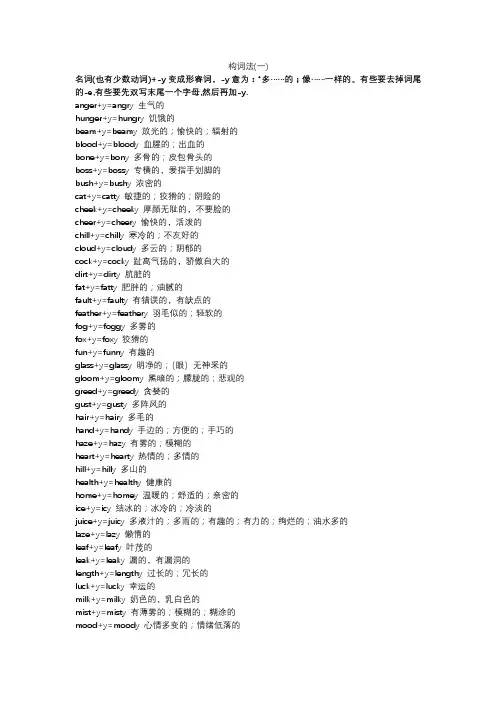
构词法(一)名词(也有少数动词)+-y变成形容词,-y意为:“多……的;像……一样的。
有些要去掉词尾的-e,有些要先双写末尾一个字母,然后再加-y.anger+y=angry 生气的hunger+y=hungry 饥饿的beam+y=beamy 放光的;愉快的;辐射的blood+y=bloody 血腥的;出血的bone+y=bony 多骨的;皮包骨头的boss+y=bossy 专横的,爱指手划脚的bush+y=bushy 浓密的cat+y=catty 敏捷的;狡猾的;阴险的cheek+y=cheeky 厚颜无耻的,不要脸的cheer+y=cheery 愉快的,活泼的chill+y=chilly 寒冷的;不友好的cloud+y=cloudy 多云的;阴郁的cock+y=cocky 趾高气扬的,骄傲自大的dirt+y=dirty 肮脏的fat+y=fatty 肥胖的;油腻的fault+y=faulty 有错误的,有缺点的feather+y=feathery 羽毛似的;轻软的fog+y=foggy 多雾的fox+y=foxy 狡猾的fun+y=funny 有趣的glass+y=glassy 明净的;(眼)无神采的gloom+y=gloomy 黑暗的;朦胧的;悲观的greed+y=greedy 贪婪的gust+y=gusty 多阵风的hair+y=hairy 多毛的hand+y=handy 手边的;方便的;手巧的haze+y=hazy 有雾的;模糊的heart+y=hearty 热情的;多情的hill+y=hilly 多山的health+y=healthy 健康的home+y=homey 温暖的;舒适的;亲密的ice+y=icy 结冰的;冰冷的;冷淡的juice+y=juicy 多液汁的;多雨的;有趣的;有力的;绚烂的;油水多的laze+y=lazy 懒惰的leaf+y=leafy 叶茂的leak+y=leaky 漏的,有漏洞的length+y=lengthy 过长的;冗长的luck+y=lucky 幸运的milk+y=milky 奶色的,乳白色的mist+y=misty 有薄雾的;模糊的;糊涂的mood+y=moody 心情多变的;情绪低落的mop+y=moppy 拖把似的;(头发)蓬乱的mouse+y=mous(e)y 多鼠的;胆小的;悄悄的mud+y=muddy 多泥的need+y=needy 贫困的noise+y=noisy 喧哗的oil+y=oily 油腻的;圆滑的peach+y=peachy 桃色的;漂亮的;极好的pick+y=picky 过分讲究的;过分挑剔的pig+y=piggy 猪一般的;肮脏的;贪婪的price+y=pric(e)y 价格高昂的rain+y=rainy 多雨的risk+y=risky (爱)冒险的rock+y=rocky 多岩石的room+y=roomy 宽敞的,有很多空间的rose+y=rosy 玫瑰红的;红润的;乐观的rust+y=rusty 生锈的;变迟钝的;陈旧的salt+y=salty 咸的;风趣的;老练的;泼辣的sand+y=sandy 多沙的;沙质的seed+y=seedy 多籽(核)的;成熟的sex+y=sexy 性感的scare+y=scar(e)y 惊慌的;胆小的;骇人的shade+y=shady 阴凉的shadow+y=shadowy 多荫的;有影的shake+y=shaky 摇晃的;不稳定的;有病的shell+y=shelly 多贝壳的;有壳的shine+y=shiny 晴朗的;发亮的show+y=showy 炫耀的;显眼的;艳丽的shower+y=showery 多阵雨的;阵雨(般)的silk+y=silky 丝绸般的;奉承讨好的silver+y=silvery 银色的;(声音)清脆的skin+y=skinny 皮包骨头的sleep+y=sleepy 想睡的;困乏的;懒散的;寂静的smell+y=smelly 难闻的smoke+y=smoky 多烟的;烟状的sneak+y=sneaky 偷偷摸摸的,鬼鬼祟祟的snow+y=snowy 多雪的;雪白的speed+y=speedy 迅速的sport+y=sporty 像运动员的;花哨的star+y=starry 布满星辰的stick+y=sticky 粘性的stone+y=ston (e)y 多石头的;冷酷的storm+y=stormy 多风暴的;烈性子的;激烈的sun+y=sunny 阳光灿烂的,晴朗的sweat+y=sweaty 汗湿透的;吃力的taste+y=tasty 好吃的,可口的tooth+y=toothy 多齿的;露齿的trick+y=tricky 狡猾的;困难的water+y=watery 多水的;水汪汪的;淡的wave+y=wavy 多浪的;波动的wealth+y=wealthy 富裕的weed+y=weedy 杂草丛生的wind+y=windy 多风的;狂暴的wine+y=winy 像酒的;醉态的;(空气)清新的word+y=wordy 多言的;冗长的构词法(二)-age:行为及其结果,动作的结果,场所,情况,总称,身份。
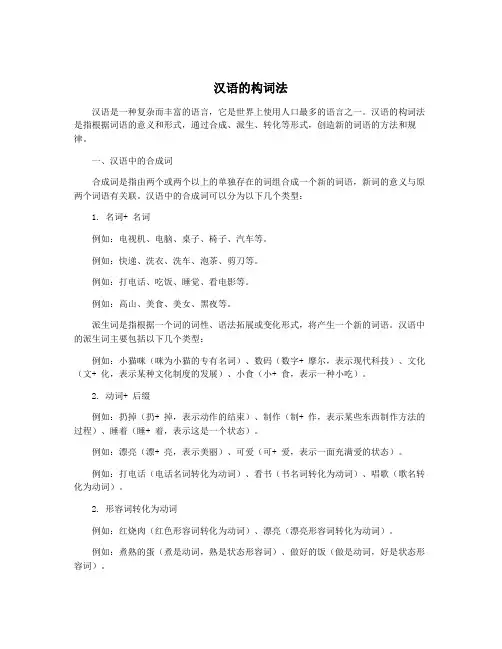
汉语的构词法汉语是一种复杂而丰富的语言,它是世界上使用人口最多的语言之一。
汉语的构词法是指根据词语的意义和形式,通过合成、派生、转化等形式,创造新的词语的方法和规律。
一、汉语中的合成词合成词是指由两个或两个以上的单独存在的词组合成一个新的词语,新词的意义与原两个词语有关联。
汉语中的合成词可以分为以下几个类型:1. 名词+ 名词例如:电视机、电脑、桌子、椅子、汽车等。
例如:快递、洗衣、洗车、泡茶、剪刀等。
例如:打电话、吃饭、睡觉、看电影等。
例如:高山、美食、美女、黑夜等。
派生词是指根据一个词的词性、语法拓展或变化形式,将产生一个新的词语。
汉语中的派生词主要包括以下几个类型:例如:小猫咪(咪为小猫的专有名词)、数码(数字+ 摩尔,表示现代科技)、文化(文+ 化,表示某种文化制度的发展)、小食(小+ 食,表示一种小吃)。
2. 动词+ 后缀例如:扔掉(扔+ 掉,表示动作的结束)、制作(制+ 作,表示某些东西制作方法的过程)、睡着(睡+ 着,表示这是一个状态)。
例如:漂亮(漂+ 亮,表示美丽)、可爱(可+ 爱,表示一面充满爱的状态)。
例如:打电话(电话名词转化为动词)、看书(书名词转化为动词)、唱歌(歌名转化为动词)。
2. 形容词转化为动词例如:红烧肉(红色形容词转化为动词)、漂亮(漂亮形容词转化为动词)。
例如:煮熟的蛋(煮是动词,熟是状态形容词)、做好的饭(做是动词,好是状态形容词)。
总之,汉语的构词法是非常丰富和复杂的,合理地应用构词法可以使语言更加生动、形象。
因此,在汉语学习过程中,我们应该认真学习和应用构词法,以便更好地理解和运用汉语。
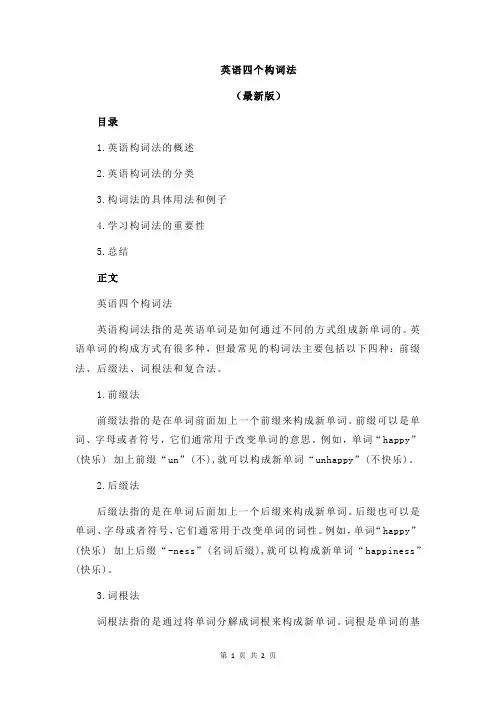
英语四个构词法(最新版)目录1.英语构词法的概述2.英语构词法的分类3.构词法的具体用法和例子4.学习构词法的重要性5.总结正文英语四个构词法英语构词法指的是英语单词是如何通过不同的方式组成新单词的。
英语单词的构成方式有很多种,但最常见的构词法主要包括以下四种:前缀法、后缀法、词根法和复合法。
1.前缀法前缀法指的是在单词前面加上一个前缀来构成新单词。
前缀可以是单词、字母或者符号,它们通常用于改变单词的意思。
例如,单词“happy”(快乐) 加上前缀“un”(不),就可以构成新单词“unhappy”(不快乐)。
2.后缀法后缀法指的是在单词后面加上一个后缀来构成新单词。
后缀也可以是单词、字母或者符号,它们通常用于改变单词的词性。
例如,单词“happy”(快乐) 加上后缀“-ness”(名词后缀),就可以构成新单词“happiness”(快乐)。
3.词根法词根法指的是通过将单词分解成词根来构成新单词。
词根是单词的基本部分,通常是一个或多个字母。
例如,单词“correct”(正确) 可以分解成词根“cor”(共同) 和“rect”(直),然后通过加上后缀“-ly”(副词后缀) 来构成新单词“correctly”(正确地)。
4.复合法复合法指的是将两个或多个单词组合在一起来构成新单词。
例如,单词“book”(书) 和“shop”(商店) 可以组合在一起构成新单词“bookshop”(书店)。
学习构词法对于学习英语非常重要。
它可以帮助我们更好地理解单词的意思和用法,并且可以帮助我们更容易地记住单词。
通过学习构词法,我们可以更好地掌握英语单词,提高我们的英语水平。
合成词有哪几种构词方式
汉语合成词主要有复合式、附加式、重叠式三种构词方式。
语素是最小的音义结合定型的构词单位,语素的功能在于构词,有些语素能够独立成词。
词根是表示基本意义的语素。
你问的构词法是指复合词,其构词法可以分七类。
1.联合型:由两个相同、相近、相关或者相反的词根并列组合而成。
例如:吮吸、朋友、美丽、妻子、口舌、忘记、动静。
2.偏正型:两个词根有偏有正,前一个词根修饰限制后一个词根,分定中型和状中型。
例如:象牙、双杠;雪白、痛恨。
3.中补型:后一词根补充说明前一词根,意义以前一词根为主。
前一次跟表动作,后一词根表结果,例如:延长、放大。
前一词根表事物,后一词根表单位,例如:书本、诗篇。
4.动宾型:前一词根表示动作行为,后一词根表示动作所支配、关涉对象。
例如:举重、动员、承包。
5.主谓型:前一词根表示被陈述的事物,后一词根是陈述前一词根。
例如:地震、心疼、国营、月亮。
6.连动性:由两个表示先后动作的词根构成。
例如:来访、查办。
7.重叠型:由两个相同的词根相叠而成。
例如:哥哥、刚刚、常常、大大。
构词法中的构词规则构词法,又被称为词形变化学,是研究词的构成和形态变化规律的一门学科。
在语言中,通过构词法可以了解词汇的构成方式,了解单词的来源和词义的变化。
构词规则是构词法中的重要内容,它指导着词语的形成和发展。
在本文中,我们将介绍一些常见的构词规则。
一、前缀和后缀构词规则1.前缀构词规则前缀是附加在词根前面的一个或多个字母或音节,用以改变词的词义或词类。
常见的前缀有:un-、dis-、re-、mis-等。
例如:- unhappy:un-表示否定,意为不快乐的;- dislike:dis-表示否定,意为不喜欢;- rebuild:re-表示重新,意为重建;- misunderstand:mis-表示错误,意为误解。
2.后缀构词规则后缀是附加在词根后面的一个或多个字母或音节,用以改变词的词义或词类。
常见的后缀有:-able、-ful、-ness、-er等。
例如:- comfortable:-able表示能够,意为舒适的;- hopeful:-ful表示充满,意为充满希望的;- happiness:-ness表示状态,意为幸福;- teacher:-er表示职业,意为教师。
二、合成构词规则合成构词是指通过两个或多个独立的词根组合形成新的词语。
合成构词常用于形容词、名词和动词的构成。
例如:- blackboard:black和board组合而成,意为黑板;- football:foot和ball组合而成,意为足球;- brainstorm:brain和storm组合而成,意为头脑风暴。
三、转化构词规则转化构词是指通过改变词的词类而形成新的词语,常见的转化构词包括名词转动词、形容词转名词等。
例如:- email(n.):名词email可以转化为动词email,意为发送电子邮件;- friend(n.):名词friend可以转化为形容词friend,意为友好的。
四、派生构词规则派生构词是指通过在词根或词素中添加前缀、后缀或其他词素的手段,生成新的词语。
词汇是学习语言的基础,理解和掌握构词法可以提高记忆单词的效率,有助于我们扩大词汇量.英语构词法主要有:合成转化法、派生法、混成法,截短法和首字母缩略法,其中前三种最重要.一、合成(Compounding)由两个或更多的词合成一个词,有的用连词符号“一”连接,有的直接连写在一起。
合成法主要有:(1)合成名词:①n+n nclassroom, schoolyard, spaceship, newspaper, postman, housewife,等。
②adj +n nmainland, blackboard, gentleman, newcomer(新来者),best—seller(畅销书),shorthand( 速记)③v+n npickpocket(扒手),breakwater(防水堤), runway(跑道),rush-hour(高峰时间),rubstone(磨刀石)④—ing+n nreading-room, waiting—room, sleeping-pill(安眼药), writing desk⑤adv / prep +n nafternoon, onlooker(旁观者)⑥n+ing nhandwriting(书法),sightseeing, horse riding, sun—bathing(日光浴)⑦n+adv npasser-by (过路人) breakthrough(重大突破)get—together, turn—off(断开),,breakdown(衰落)⑧adv+v noutbreak(爆发), output(输出),input, downfall(垮台)⑨n+介词短语 nfather—in-law(岳父),son—in-law(女婿),command-in-chief(总司令),comrade-in-arms(战友)(2)合成形容词①adj / 数词+ n+—ed adjkind—hearted, cold—blooded, write-haired, middle-aged,one—eyed (独眼的),three—legged②adj+—ing adjgood-looking (相貌好看的),easy-going(随和的),English—speaking,③adj+n adjlow-price, high-class(高级的),second-hand(旧的),everyday,large—scale(大规模)④n+adj adjlifelong(终生的),nationwide(全国性的),worldwide, world—famous,color-blind(色盲的),airsick(晕飞机的)⑤n+ 分词 adjman-made, state—owned(国有的), radio-equipped, sunburned(晒黑的)peace—loving(热爱和平的)fun-loving(爱开玩笑的)⑥adv+分词 adjwell-known, widespread (分布广的),well—informed(消息灵通的),hard—working(勤劳的) Far-reaching(深远的)long-lasting(耐用的)(3)合成动词①adv +v voverthrow(推翻),undergo(经历),uphold(高举), overhear(无意),output(输出),input,②n+v vsleep-walk(梦游),daydream(做白日梦),spoonfeed(填鸭式灌输),sun—bathe, mess—produce(大规模生产)③adj+v vwhitewash(粉刷),blacklist(列入黑名单),dry—salt(干腌), deep-freeze(冷藏)(4)合成副词①adv+adv advhowever, whenever, moreover(而且), therefore,②adj+adv adveverywhere, nowhere, somewhere, anywhere,③n+adv advheadfirst(头朝下),daylong(整天),nightlong(通宵)④adv+n advdownstairs, upstairs, downhill, inside, westward, upward,(5)合成代词some, any, every, no 可与 -thing –one, -body 合成代词,代词宾格(物主代词)+self(selves): something, everything, anyone nobody, yourselves, himself,二、转化( conversion )由一种词类转化成另一种或几种词类1.n advLet‘s go hand in hand。
英语构词法的分类
英语构词法是研究英语单词形成和构造规律的一门学科。
根据单词的构造方式和来源,可以将英语构词法分为以下几个分类:
1.派生法(Derivation):派生法是最常见的构词方式之一,通过在词根或词干前后加上前缀或后缀来形成新的单词。
例如,通过在词根“friend”前加上前缀“un-”,我们可以得到“unfriend”,意为“取消朋友关系”。
2.复合法(Compounding):复合法是将两个或多个独立的词组合在一起形成新单词的方式。
这些词可以是名词、动词、形容词等。
例如,“blackboard”(黑板)是由“black”(黑色)和“board”(板)组合而成的。
3.缩略法(Abbreviation):缩略法是将单词或词组的一部分缩短形成新的单词。
例如,“ad”(广告)是“advertisement”的缩略形式。
4.混合法(Blending):混合法是将两个或多个词的一部分合并来形成新的单词。
例如,“brunch”(早午餐)是由“breakfast”(早餐)和“lunch”(午餐)合并而成的。
5.借词法(Borrowing):借词法是指从其他语言中直接借用单词或词组。
英语中有很多借词,如“pizza”(比萨饼)来自意大利语。
6.转化法(Conversion):转化法是通过改变词性或词类来形成新的单词。
例如,“email”(电子邮件)可以作为名词使用,也可以作为动词使用。
以上是英语构词法的一些主要分类。
通过了解这些不同的构词方式,我们可以更好地理解和运用英语单词的形成规律。
现代汉语构词法是指在汉语中,通过组合不同的词语来构成新的词语
的方法。
它是汉语词汇的基本构成方式,也是汉语词汇发展的重要途径。
汉语构词法的基本原则是:以词为单位,以词组为基础,以词素为基
本单位,以词根为基本结构。
汉语构词法的基本形式有四种:单组合、双组合、复组合和复叠组合。
单组合是指由一个词素构成的词语,如“花”、“木”、“火”等。
双组合是指由两个词素构成的词语,如“花木”、“火水”等。
复组合是指由三个或三个以上的词素构成的词语,如“花木火”、“火水木”等。
复叠组合是指由两个或两个以上的词素重复构成的词语,如“花花”、“木木”、“火火”等。
汉语构词法的基本原则和基本形式,是汉语词汇发展的重要基础。
它
不仅可以帮助我们更好地理解汉语词汇的构成,而且可以帮助我们更
好地掌握汉语词汇的发展规律。
英语量化记忆法之7种英语构词法7种英语构词法目录7种英语构词法 (2)一、派生法 (2)二、转化法 (3)三、合成法 (6)四、逆成法 (8)五、混成法 (8)六、截短法 (9)七、首尾字母缩略法 (9)7种英语构词法一、派生法派生法:在一个单词的前面或后面加上词缀构成新词的方法,称为派生法。
派生构词有三大要素:词根、前缀和后缀。
也有人称之为两大要素:自由词素和粘附词素。
派生法的结构是:粘着词素+自由词素+粘着词素。
(一)英语词缀分成前缀和后缀两种。
前缀是加在词根或单词前面的部分。
它具有一定的含义。
同一词根或单词加上不同的前缀,即可构成不同的新词。
pre—(前):prewar (战前的)post—(后):postwar(战后的)im—(入):import (输入)前缀可以增加、改变或加强一个词根或单词的意义,也可以改变一个单词的词类。
如:增加意义:hemi-(半)→ hemisphere(半球)改变意义:un-(不)→ unhappy(不快乐的)加强意义:de-→ describe(描写)改变词类:en-(使)→ enlarge(扩大)前缀的意义主要有这几种:1、表示否定意义,如:anti-: anticancer抗癌剂2、表示数目和数量,如:multi-: multicolored多彩的3、表示时间、空间和程度,如:a-: aboard在船上4、表示特殊意义,如:auto-: autobiography自传后缀是加在词根或单词后面的部份。
后缀有四种,即:名词后缀、形容词后缀、动词后缀和副词后缀。
后缀不仅改变词的意义,而且使单词由一种词类转化成另一种词类。
1、名词后缀,如:表示人:-er: worker工人; teacher教师-ist: artist艺术家; chemist药剂师表示物:-or: tractor拖拉机; generator发电机-ant: disinfectant消毒剂; dependant依附物表示抽象名词:-hood: childhood童年; neighborhood邻居关系-ship: friendship友谊; horsemanship骑马术表示集合名词:-ry: peasantry农民总称; citizenry公民总称-age: mileage英里数; teenage十几岁的时期表示场所地点:-ery: piggery养猪场; greenery花房,温室-ern: saltern制盐场; cavern洞穴表示疾病:-oma: trachoma沙眼症; neuroma神经瘤-itis: bronchitis支气管炎; arthritis关节炎表示……学:-logy: zoology动物学; anthropology人类学-ics: electronics电子学; statistics统计学2、形容词后缀:表示一种事物具有或属于某种性质或状态。
1 Word formation 构词法 一、主要构词法 1. 转化(conversion) A. 动词转化为名词 Let me have a try. We stopped there for a swim. She had a cry about the sad news. She gave the girl a kiss. You could make a guess at it. I bought a bag of bird feed. His heart beats were getting weaker. B. 名词转化为动词 The results of the experiments are tabled at the back of book. He pinned the notice on the blackboard. The expedition will map the South Pole. His name headed the list. Many of his friends backed his plan. He fathered many inventions. She mothered two children and adopted a third. The library houses 6000000 books. He thirsted for knowledge. We plan to winter in Italy. C. 形容词转化为动词 The city quieted down again. He was unable to calm her down. Please warm up the cold meat. In the bright sunlight she had to narrow her eyes. He pretends to busy himself writing. Don’t dirty your new dress. Living conditions have bettered a great deal. D. 少数其他词类也可用作动词 This will help to further the science. The employees have downed tools. They upped the price of petrol. Truth will out. E. 形容词转化为名词 I enjoyed the quiet of the country. The temperature reached a new high. 2
A single to London, please. Few whites live in West Africa. F. 形容词转化为副词 The eagle flies high. You can live cheaper in the smaller towns. Are you staying long? Her head was bent low. G. 其他 They asked him to give a repeat performance. (动――形) He walked north.(名――副) 2. 派生 (derivation) (1) 后缀 A. 构成名词的后缀 -ability: stability capability -age: shortage marriage -al: dismissal withdrawal -an: American Asian -ance: attendance performance -ant: immigrant applicant -ary: dictionary boundary - ation: examination temptation - cy: accuracy efficiency -dom: kingdom freedom wisdom -ee: employee refugee -eer: engineer profiteer -ence: existence preference -er: driver writer -ese: Chinese Japanese -ess: actress princess -ful: handful spoonful -hood: childhood neighbourhood -ian: magician musician -ibility: possibility responsibility -ing: feeling shopping -ion: action collection -ism: Marxism socialism -ist: communist novelist -ity: equality majority -man: fireman chairman 3
-ment: arrangement development -ness: happiness weakness -or: actor visitor -ry: slavery bravery -ship: friendship leadership -ty: safety loyalty -ure: failure pressure -ware: software hardware glassware silverware -work: housework paperwork -y: modesty difficulty discovery B 构成形容词的后缀 -able: valuable comfortable -al: cultural national -an: American African -ant: pleasant ignorant -ary: imaginary legendary -ate: passionate fortunate -ed: excited amazed -en: golden wooden -ent: dependent different -ese: Chinese Japanese -ful: beautiful hopeful -ian: Canadian Palestinian -ible: permissible contemptible -ic: realistic poetic -ical: classical economical -ing: convincing amusing -ish: selfish foolish -ive: active effective -less: endless homeless -like: warlike childlike -ly: friendly orderly -ous: nervous dangerous -some: troublesome tiresome -wide: worldwide nationwide area-wide company-wide -worthy: trustworthy praiseworthy -y: rainy windy C. 构成副词的后缀 -ly: clearly suddenly 4
-down: headdown face-down palm-down -first: head-first feet-first -ward(s): homeward onward(s) westward(s) backward(s) -wise: likewise clockwise length-wise anticlockwise D. 构成动词的后缀 -ate: activate originate motivate -en: widen sharpen brighten sweeten -ify: simplify purify justify -ize: apologize modernize emphasize E. 构成数词的后缀 -teen: thirteen fourteen -ty: twenty thirty -th: fifth eighth (2) 前缀 A. 可用来改变词类的前缀 a- 加在名词前构成形容词或副词: asleep aboard be- 加在名词或形容词前构成动词: befriend behead belittle em- 加在名词等前构成动词: empower embitter en- 加在名词前构成动词: endanger encourage enslave en- 加在形容词前构成动词: enrich enlarge enable out- 加在名词或形容词前构成动词: outnumber outpace outsmart B. 可用来构成反义词的前缀 de-: de-emphasize decolonize dis- (构成动词): dislike distrust disagree dis-(构成名词): disbelief discomfort dis-(构成形容词): disloyal dishonest il-: illegal illogical im-: impatient impolite imbalance immoral immature in-: incapable informal independent ir-: irregular irresponsible mal-: maltreatment malnutrition non-: non-essential non-economic non-smoker non-violent un-(构成形容词):unable unsafe unlucky